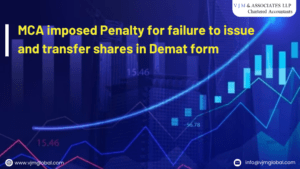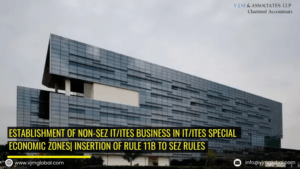Authority for Advance Ruling, Maharasthra (“AAR”) discussed in the matter of M/s Gandhar Oil Refinery (India) Limited (“Applicant” for brevity) that whether State-wise GST registration is required where the applicant is storing goods after import and therefrom applicant is supplying such goods to the ultimate customer? The applicant is not having any godown in such states as he is storing goods in the port warehouse.
He is only having a head office at Mumbai, Maharasthra from where all related activities are carried out such as entering into agreement with supplier, issuance of Letter of credit, receipt of commercial import invoice etc.
AAR has held that for transaction of Import, place of supply is location of importer, i.e., Mumbai, Maharasthra. Further, for the purpose of Section 22 of CGST Act, location of supplier from where he is making supply shall be his head office located at Mumbai, Maharashtra.
Accordingly, applicant can clear imported goods through issuance of invoice from his head office even through goods are lying in port warehouse of different states by considering such supply as inter-state supply and by discharging IGST on it in Maharashtra. Applicant is not required to have separate registrations in different states.
1. Brief facts of the State-wise GST registration case
- M/s Gandhar Oil Refinery (India) limited (“Applicant”) is engaged in trading activity of non-coking coal and manufacturing activities of petroleum products.
- Applicant is importing non coking coal in various states and also purchasing from dealers located in India.
- Applicant stores such imported coal at warehouse of port and clear goods directly to customer from such port as per requirement. In such states applicant is only having liaison office for ease of doing business.
- Earlier Law (i.e., VAT) made it compulsory for applicant to obtain sales tax registrations in all such states where applicant was importing goods. Post implementation of GST, applicant got GST numbers for all those states though migration process.
- All decision
making and documentation are made at registered office (R.O.) located in
Mumbai, Maharashtra such as:
- agreement with foreign supplier for import are entered with R.O. ,
- letter of credit and related banking facilities are opened with banks located in Maharashtra,
- Commercial import invoice is made by supplier in name of R.O.
- Bill of lading also mentions the name and address of R.O. etc.
- After goods reach port, same are stored at port warehouse and are directly delivered to customer from such warehouse. Applicant is not having any godowns in such states.
- Presently, applicant is carrying coal business under GST number of Maharashtra, i.e., entire sale is disclosed under GST number of Maharashtra.
2. Matters raised before Advance Ruling Authority (“AAR”)
- Can applicant cancel GST registration of different states, if law permits to do business from head office under GST number of Maharashtra?
- Whether the applicant can raise the invoice from Mumbai Head Office for imports received at various ports, located in various states in India and charge IGST from Mumbai to customers in various states?
- If applicant cancels separate registration in various state can he do the transaction on Mumbai head office GSTN, then in case of issuance of E way bill is it correct to mention the GSTN of Mumbai and mention Dispatch place of port of respective state/port?
3. Contentions of Applicant
The applicant has contended the following points to substantiate his State-wise GST registration case:
- As per Section 11 of IGST Act, 2017, for the transaction of import, the place of supply shall be the location of the importer, i.e., the Registered office of the applicant.
- Supply of imported goods through Mumbai office shall be considered as “Inter-State Supply” by virtue of Section 7(3) of IGST Act, 2017 and therefore, the transaction shall attract IGST.
- As per section 22 of the CGST Act, 2017, every supplier is liable to be registered under the GST Act in the state “from where” he makes taxable supplies of goods or services or both. Accordingly, registration is required in the state from where taxable supplies are made, therefore, for registration purposes, “origin” should be determined instead of “destination”.
- Therefore, the Location of the supplier is relevant for registration which is usually the place where the business is ordinarily carried out and where the supplier holds control over goods ready to deliver.
- Word “Location” refers to the site or premises (geographical point) where the supplier is situated. Accordingly, in this case, the location of applicant is his office in the state of Maharashtra.
4. Interpretation by AAR
AAR has interpreted provisions of CGST Act and IGST Act about State-wise GST registration as follows:
- Transaction of import is considered as “Supply in course of Inter-State trade or commerce” by virtue of Section 7(2) of CGST Act, 2017.
- For the transaction of import, the place of supply shall be the location of the importer which is the Mumbai office in the given case.
- For the purpose of section 22, the place from where the applicant is making a taxable supply of goods shall be his location which is Mumbai office in the given case.
- Even if the applicant has godowns in different states, he can still opt to clear such goods through an invoice issued from the Mumbai office on payment of IGST in the state of Maharashtra.
- Such supply of imported goods will be considered as inter-state supply or intra-state supply depending upon the place of supply of such goods as per sections 10 and 11 of IGST Act, 2017.
5. Conclusion
- On the first question, AAR has ruled that applicant is not required to have separate registrations in all the states that are State-wise GST registration.
- However, AAR did not respond to the second and third questions as they are not covered under section 97 of the CGST Act, 2017.
Read more on All about assessment under GST






